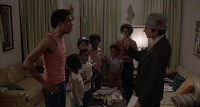A retrospective of Lars von Trier from rare to well-known. Part 1 of the "Auteur Review" examines Lars von Trier's earliest films which comprise of his more classical experimental approaches to cinema.
The Trip To Squashland (Turen til Squashland). 1967. Runtime 2:01.
Synopsis: I'm the whimsical stop-motion world of Squashland, we hear the sing along tune of a squash helping rabbits.
Reflections: A fun, catchy, cute short made by 11 year old Lars. Stop motion is a long process and I can only imagine this to be a massive undertaking for a young child. A sign of things to come.
Grade: 4.0
----
The Orchid Gardener (Orchidégartneren). 1977. Runtime 35:17.
Synopsis: A young man's growing obsession with death as he pursues his love, a sadistic nurse at the psych ward he attends.
Reflections: An interesting study in experimental filmmaking and black and white photography. Lars' ability to portray complex emotions gives this short film some substance. Weak points include lack of refinement and slow pacing.
Grade: 4.0
----
Befrielsesbilleder. 1982. Runtime 57 minutes.
Synopsis: Missing subtitles and not speaking Danish, I could only surmise that this film is about a relationship between a Nazi and an American spy set against the backdrop theme of the horrors of war.
Reflections: Great cinematography, solid minimalist acting. Stylistically this film is the precursor to The Element of Crime, especially the first half. This would be Lars von Trier's graduation film, setting him lose to wreak havoc upon European cinema.
Grade: 6.1
----
The Element of Crime. 1984. Runtime 1 hour, 43 minutes.
Synopsis: Post apocalyptic noir sets the stage for a murder investigation led by hard boiled Detective Fisher. Fisher's method of investigation is following in the footsteps of the murderer in order to understand and arrest him. The environment and mood is eerie and haunting.
Reflections: The Element of Crime is defined by masterful and imaginative cinematography making it one of the greatest experimental films ever to grace the screen. The only negative I can highlight is a slow pace and a somewhat undefined ending. The film is an early Lars von Trier masterpiece and the height of his classical style of experimental filmmaking (a style which would conclude with Europa). The Element of Crime would be Lars von Trier's first nomination for the Palme d'Or.
Grade: 8.8
----
Epidemic. 1987. Runtime 1 hour, 46 minutes.
Synopsis: Lars and Niels are printing out a screenplay to turn in for their upcoming deadline. The screenplay fails to print and it becomes clear why, it was erased. The duo decide they didn't much like the script anyway and embark on writing Epidemic. During the writing process, the two begin to get sick and the sickness progresses as we cut to scenes from the script the two are writing.
Reflections: Part two of Lars so called 'Europa Trilogy', Epidemic is a major step backwards from part one of the trilogy, The Element of Crime. Cinematography is not as imaginative and the story drags. The coolest thing about epidemic is that its structure is a clever concept to make a low budget film, and the acting is a high point. The final scene is a saving grace as well.
Grade: 4.2
----
Medea. 1988. Runtime 1 hour, 17 minutes.
Synopsis: A retelling of the Greek classic tragedy Medea. A younger devilish Udo Kier plays Jason who married a young bride, despite currently having a wife - Medea. Revenge ensues.
Reflections: The film feels very sparse, in content and set. Set design is often minimalist but effective. The film is shot at a slow, brooding pace, perhaps to stretch material for a 30 minute short film into a feature. Unfortunately the result is very boring. Still, inspired cinematography surfaces throughout.
Strong, minimalist, deadpan acting is strong. The poor quality copy floating around can only hint at how sweet this film might look - a proper restoration would perhaps be worth giving this film a re-watch. Medea is the first surfacing of what would become Lars lead archetype, a strong clever woman who overcomes her circumstances.
Grade: 5.9
----
Europa. 1991. Runtime 1 hour, 52 minutes.
Synopsis: At the end of the war a handful of Nazi "Werewolves" continue clandestinely to kill Germans who aided the Allied Forces during the war. An American general has genuine interests in rebuilding the country. Train service attendant Leopold Kessler is caught in the middle of the politicking, pressuring him to choose sides.
Reflections: Europa is beautifully and imaginatively shot, primarily in black and white. A hypnotherapist instructs us to become Kessler, narrating his story and projecting it onto the viewer's gaze. Kessler's neutral and boring character provides a nice clean slate to reflect the audiences emotions into.
However this neutrality ultimately results in an uncompelling protagonist, and therefore an overall unsatisfying viewing experience, despite an immaculate technical and interesting experimental presentation. The film won three prizes at Cannes, but lost the Palme d'Or to a film with an equally uncompelling lead character, Barton Fink (Barton Fink).
Grade: 7.0














